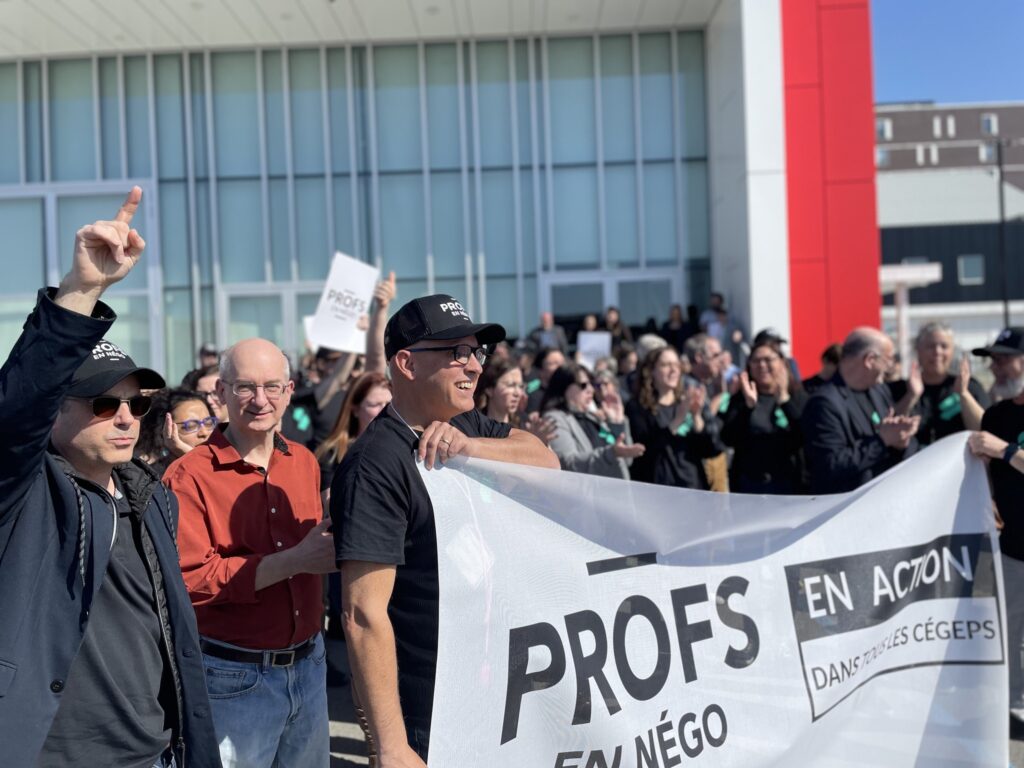INFO-NÉGO #3
Takeaway
Mobilization drives our bargaining efforts
To do
Participate in union actions in your workplaces on May 1 and afterwards
Read
ASPPC’s detailed bargaining demands
After the government presented its detailed offers at the central table on March 27, the ASPPC bargaining committee received a detailed management offer at the sectoral table on April 6. At the next bargaining session on April 18, the union submitted its detailed demands based on the consultations at the general assemblies in January and February 2023.
In December 2022, when the Comité patronal de négociation des collèges (CPNC) tabled its initial offers, it was already clear that there was a gulf between our visions for the college system. The last few weeks have only confirmed our fears. Both the media operation surrounding the forums on the government’s priorities and Treasury Board’s recent offer on intersectoral issues at the central table have shown the deeply political and highly centralized nature of the government’s stance in this bargaining round.
Employer’s offers: More flexible and competitive CEGEPs
In the case of the college network, the politicization of the bargaining process has meant employer offers that are almost exclusively focused on the government’s priorities. We believe that the CAQ’s appetite for short programs of study and distance learning, on the pretext of promoting access to education for a diverse student population, is likely to exacerbate the deep inequities that already exist. For example, the employer’s enthusiasm for distance education, and particularly asynchronous teaching, seems to ignore all the evidence in the academic literature about how this affects student motivation, persistence, and success.
The CPNC’s concrete proposals for adapting our collective agreements to distance education are cause for concern, because of both their conception of the “digital transition” and the related specific objectives, such as the development of asynchronous courses in which teachers would surrender their intellectual property rights to the educational materials they produce.
With respect to course offerings, the employer wants to develop recognition of acquired competencies (RAC) but also to increase the use of atypical teaching schedules. In fact, they are contemplating special financial incentives to have more classes in the evenings and on weekends, while ignoring the many teachers who are already working atypical hours without being paid more, such as Cont’Ed teachers and the supervisors of stages in hospitals.
Finally, when it comes to work organization, the details in the employer’s April 6 submission indicate a desire to limit professional autonomy. For example, they want mandatory professional development as well as rollbacks on issues such as the creation of positions and the granting of leave.
It is clear that the calls for greater flexibility and agility amount to undermining the CEGEP model and the job security of the people who work at CEGEPs.

Step up the pressure to back our demands
On April 18, it was our turn to bring to the bargaining table our concrete solutions for strengthening the CEGEP network’s capacity to provide real access to higher education in all regions of Québec. Teachers United are not prepared to allow the negotiations to be based solely on the CAQ’s priorities!
The employer’s recent offers at both the central and sectoral tables suggest that the government wants to move the talks forward and reach a quick settlement. But for that to happen, the offers would have to address the union’s concerns and lay the groundwork for a genuine dialogue.
We will have to demonstrate our resolve—by attending union assemblies, encouraging our colleagues to attend, participating in local and regional actions, and showing our colours in the workplace. During the winter session, we have seen the unions at all the CEGEPs swing into action at the local level to denounce the employer’s offers and support our demands. If we are to achieve our goals, we must continue building pressure on the ground to back our efforts at the bargaining table.

